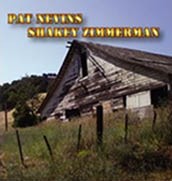Pat Nevins, Shakey Zimmerman
(Artemuse Records 2003)

It ain't a simple operation -but brave- to release a coming out disk only containing covers and succeed in make wonder is almost impossible, mostly owing to the dealt repertory. Pat Nevins is an exception. In fact, for his recent solo debut, titled Shakey Zimmerman, published by the independent Artmuse Records, he has decided to include five Bob Dylan's and five Neil Young's songs. His idea to blend some pearls of two of the most important rock repertories in a single ideal way is showed by the particular title that see the fusion of Shakey -one of the nicknames of Young- and Zimmerman -the real surname of Dylan. In this way a mature and solid disk rises, in which the performances, even if are no far from the original ones, go over the simple tribute, making Nevin's personality rosen up. Always passionate of these two songwriters, Pat has made himself known in the San Francisco Bay Area both like soloist and like member of various side-projects, but mostly for the collaboration with Paul Siegel. From 1985 to 1994 he played receiving big consents with the Deadbeats, a band known to the lovers of the Greatful Dead for having opened many concerts of theirs, and also The Band, Merl Saunders & the Rainforest Band, The New Riders of the Purple Sage, The David Nelson Band, Vassar Clements, Commander Cody, Lonnie Brooks, Koko Taylor and other's ones. During this live experience with the Deadbeats he could increase his instrumental endowments and mostly he could refine his interpretative capacities. So we can say that this disk is like a kind of end of this walking to his actual artistic maturity. The plain, born with the help of excellent players like Barry Sless at the guitar, and Bill Laymon at the bass-guitar, both at him side even when he played in the Deadhed , and known for having played in the David Nelson Band, sees also the presence of Nura Creitz at the second voice and of Mark Corsolini, drummer of the first formation of the Dark Star Orchestra. Bob Dylan and Neil Young's compositions alternate giving rise to some wonderful atmospheres, made of contrasts in clear-obscure, the whole arranged and produced in a valuable way by Nevins with the help of Julie Larson. The beginning Lonesome When You Go, from Blood On Tracks of Bob Dylan, is an excellent choice made more precious by the wonderful intro of harmonica and by the inspired Pat's voice that winds the well done touches of pedal steel. The beginning Lonesome When You Go, from Blood On Tracks of Bob Dylan, is an excellent choice made more precious by the wonderful intro of harmonica and by the inspired Pat's voice that winds the well done touches of pedal steel. The second track, Lookout Joe, coming from the Neil Young's masterpiece Tonigth's The Night, is a dark song in the origin but here it lives a second youth thanks to to an almost blues course and an excellent electric guitar in the principal level; the vocal background in the refrains of Nura Creitz. A little bit of the Rolling Thunder Revue is the performance of Tonight I'll Be Staying Here With You, cleaned by the redundant mawkish passages of Nashville Skyline. This version recalls in a less violent way the Bob Dylan's ones in 1975, for the minded use of the pedal steel or for the less impetuous singing, but ever of great effect. The pearl of the disk is Everybody's Alone, the lonely unpublished track of the album that comes from the immense files of unpublished material of Neil Young; Pat gives the best of himself and succeeds in bringing to light a now forgotten song thanks to a really intense perfomance. The next track, Went To See The Gypsy, is taken from New Morning by Dylan, and is dominated one more time by the Sless' pedal steel. The track seems to travel through an atmosphere by the crystalline and dreamy beauty. The atmospheres becomes hallucinated by the almost mantra of Last Trip To Tulsa, deriving from the first soloist work of Neil. Pat's voice is hypnotic like the total arrangement of the track, where the wonderful bass performance supports perfectly a rhythmic that brings a dark a nightly atmosphere. The less convincing track of the whole disk is Things Have Changed that plays pretentious and less inspired than the intensity of the surrounding tracks, but mostly it is lacking in that special tension that let Pat express his own feelings in these songs. Things totally changes with Ambulance Blues, solid and less tormented than the original of On The Beach, but, with no doubt, very efficacious and successful. I Threw It All Away closes the lot of Dylan's song in a typical country-rock atmosphere and puts on the way to the wonderful ending of (When You're On) The Losing End, the second interpretative top of the album. The track takes the inspiration from the study version, but thanks to the wonderful violin performance that goes to characterize the refrain, it seems to be more than fascinating and lively. Ending, this is a disk impossible to lose, both for the quality of the compositions and mostly for the great ability as interpret of the author, that gets hold of these ten compositions making a very convincing disk. The disk could be listened in preview on or bought in internet on the web-site of the Artmuse Records
Salvatore Esposito
(translate by Michela Cobino)